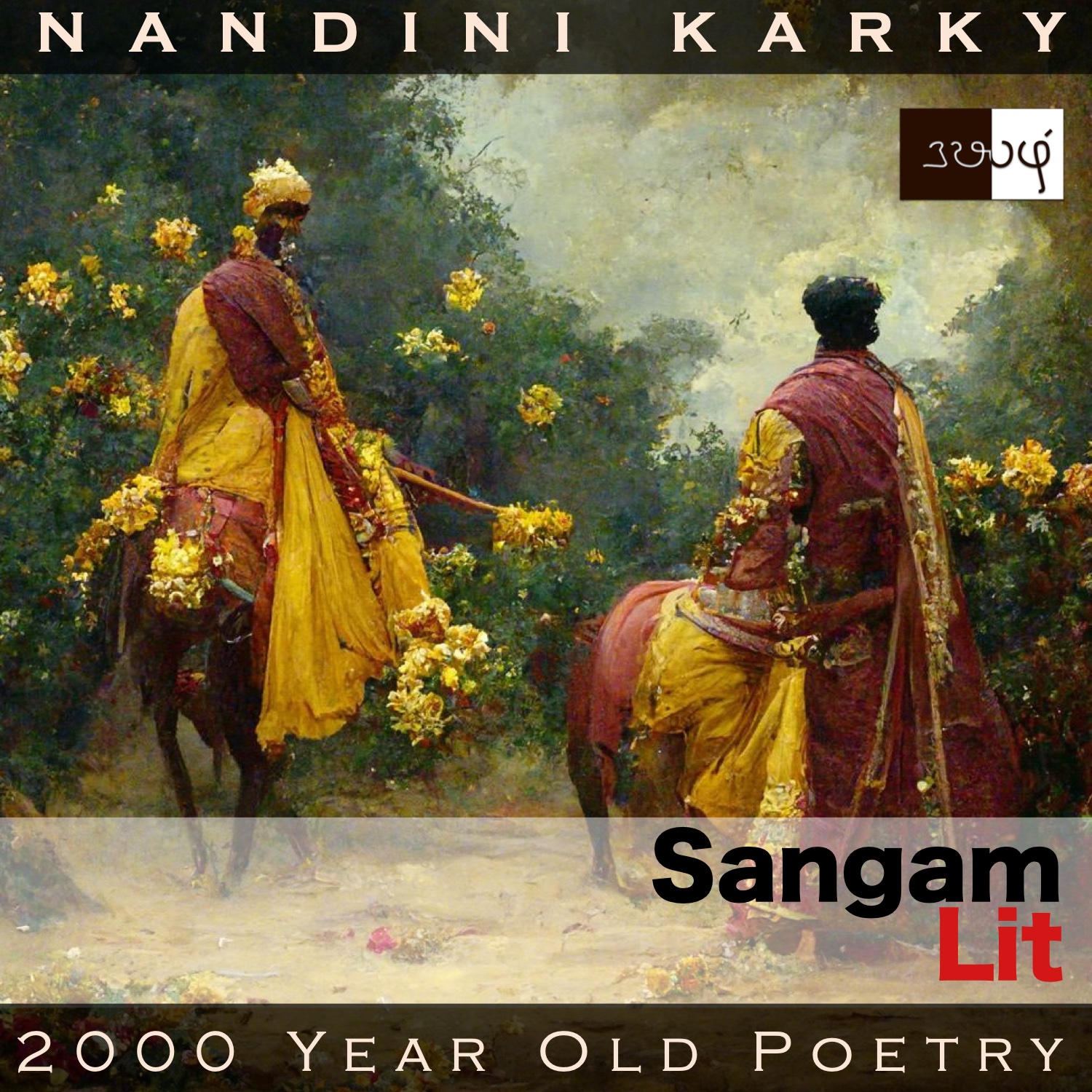Podcast: Play in new window | Download
Subscribe: Apple Podcasts | Spotify | Amazon Music | Android | iHeartRadio | TuneIn | RSS | More

In this episode, we listen to piercing words of advice rendered unto two warring kings, as portrayed in Sangam Literary work, Puranaanooru 45, sung to the Chozha kings Nalankilli and Nedunkilli. Set in the category of ‘Vanji Thinai’ or ‘king’s prowess in the battlefield’, the verse remarks on the futility of war under a given circumstance.
இரும் பனை வெண் தோடு மலைந்தோன்அல்லன்;
கருஞ் சினை வேம்பின் தெரியலோன்அல்லன்;
நின்ன கண்ணியும் ஆர் மிடைந்தன்றே; நின்னொடு
பொருவோன் கண்ணியும் ஆர் மிடைந்தன்றே;
ஒருவீர் தோற்பினும், தோற்ப நும் குடியே;
இருவீர் வேறல் இயற்கையும் அன்றே; அதனால்,
குடிப்பொருள் அன்று, நும் செய்தி; கொடித் தேர்
நும் ஓர்அன்ன வேந்தர்க்கு
மெய்ம் மலி உவகை செய்யும்; இவ் இகலே.
A rather brief Puranaanooru song that has the unique context of being sung to two Sangam kings. One is the much celebrated Chozha King Nalankilli and the other is also a Chozha King by the name ‘Nedunkilli’. At a point when both these kings were facing off, about to attack each other, the poet decides to say these words to them:
“Neither is he wearing a garland of white flowers from the tall palmyra tree nor is he wearing a garland of flowers from the black-branched neem tree; Your garland is filled with bauhinia blooms; The garland of the one who battles with you is filled with bauhinia blooms too; Even if one of you lose, it’s your clan that loses; Further, it’s not natural for both of you to win; Hence, your actions are not befitting your clan’s honour; It’s only to other kings like you, who own chariots fluttering with flags, that this hostility between you both will end up rendering exhilarating happiness!”
Time to delve into the nuances! The poet starts by remarking about the garlands both these kings are wearing. With a negation, he says these are neither made of palmyra flowers nor of neem flowers, and that both the garlands of the warring kings are filled with ‘aar’ flowers. While this looks like a statement about the kings’ fashion accessories at first glance, there’s a deep significance here. Garlands made from palmyra flowers were worn only by Chera kings whereas those made from neem flowers were worn by Pandya kings. And, you guessed right, these ‘aar’ garlands were the floral choice of Chozha kings. A side note about these ‘aar’ flowers, is that they are also called as ‘aathi’ flowers, and they bloom on the ‘yellow bauhinia tree’, commonly called as ‘yellow bell orchid tree’.
Returning to the verse, we see the poet remarking specifically about the sameness of the flowers in the garlands of the two kings to say that they both belong to the same clan. He then goes on to say that even if one of them were to lose, it’s a loss for the clan, and it’s not possible for both to win in a war either. So, all these hostile actions between these two Chozha kings will only bring dishonour to their clan, and at the same time, great joy to kings from other clans, the poet concludes!
I would like to zoom on to the thought that if you can see the sameness in you and the opponent, there is no need to be in conflict with the other. In this verse, the poet is saying that both kings are of the same Chozha lineage, and hence, a fight between them was an act of dishonour to the Chozhas. Can we extend this sameness even more broadly and see that all humans have a common lineage – that of the same species of Homo Sapiens? In that case, shouldn’t all wars, including the ones being fought now, be considered a disgrace to the human race?




Share your thoughts...